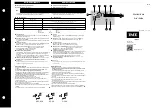
2TLC172316M0201, rev E
14
www.abb.com/ jokabsafety
2015-09-30
11 Useful life time
For the calculation of the Functional Safety data a constant failure rate had been assumed. This only applies if the
useful lifetime of the components is not exceeded. The failure rates have been calculated according to worst case
stress region for inductive load, DC. The output relays in BT50(T) have a mechanical life time of 10.000.000 cycles.
Installation and commissioning
During installation all aspects regarding the SIL level of the loop must be considered. The safety function must be
tested to ensure the expected outputs are given. When replacing a device, the loop must be shut down. In all
cases, devices must be replaced by the same type.
Proof Test procedure
The Proof Test is a periodic test performed to detect hidden faults in a safety-related system.
According to IEC 61508-2 a periodic proof test shall be realized in a safety related system to reveal potential
dangerous faults that are otherwise not detected by diagnostic test.
The Proof Test is realized when the safety related system is used in Low Demand Mode. The safety function is only
performed on demand, in order to transfer the Equipment Under Control (EUC) into a specified safe state, and
where the frequency of demands is no greater than one per year.
Procedure
1.
Verify that the operational voltage is according to the product specifications.
2.
The safe state at this safety relay is when all the safety outputs are open. With no power connected to the
safety outputs, it must be verified a high resistance state at each safety output. This can be measured with
an ohmmeter (without special accuracy). The high resistance is showed as “OL” view at a digital display.
The safety outputs are 13 – 14, 23 – 24 and 33 – 34. The safe state must be achieved when the system is
tested. All the safety devices that control the input/power A1 – A2 must be tested. The test must verify that
all the safety outputs are open, which is in safe state, when the power to the input/power A1 – A2 is
disconnected.
3.
Applying voltage to the input/power A1 – A2 and X4 energizes the safety relay outputs to the closed
position. Test that when the connection X4 is disconnected the safety relay outputs remain open when
applying voltage to input/power A1 – A2. Verify the Start button function when used in the circuit.
Perform the proof test on the complete safety system, as many times as required, to verify that it works properly.
Only if all tests are successful, the proof test is passed.


































